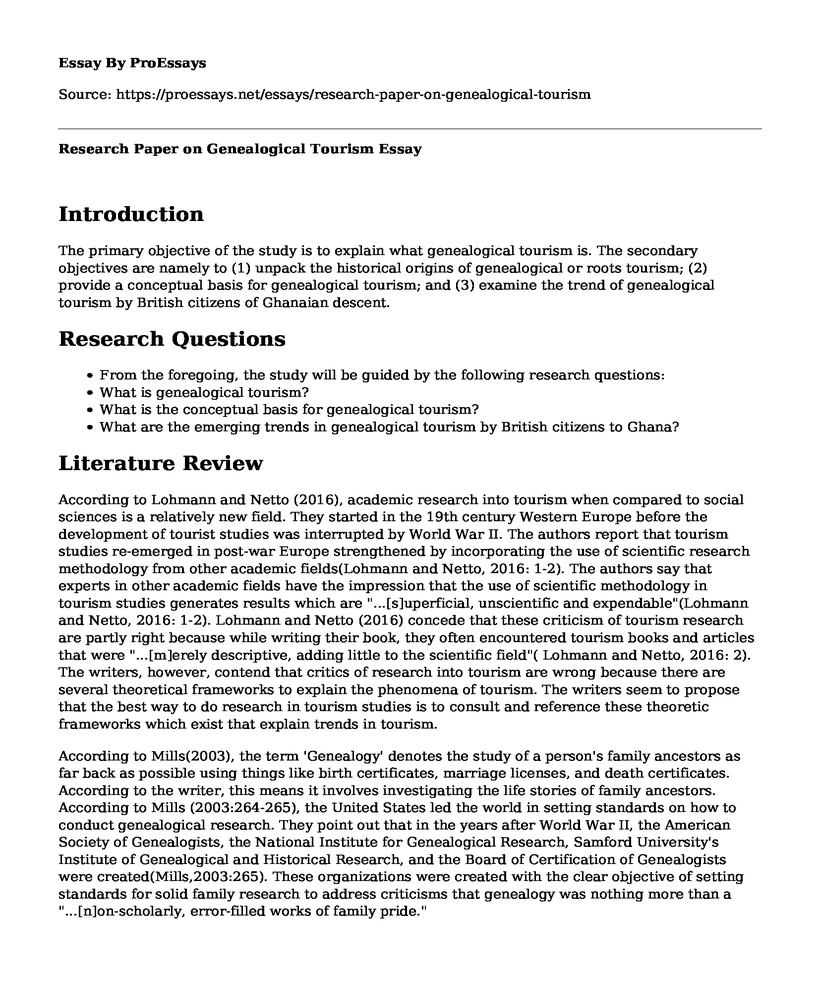Introduction
The primary objective of the study is to explain what genealogical tourism is. The secondary objectives are namely to (1) unpack the historical origins of genealogical or roots tourism; (2) provide a conceptual basis for genealogical tourism; and (3) examine the trend of genealogical tourism by British citizens of Ghanaian descent.
Research Questions
- From the foregoing, the study will be guided by the following research questions:
- What is genealogical tourism?
- What is the conceptual basis for genealogical tourism?
- What are the emerging trends in genealogical tourism by British citizens to Ghana?
Literature Review
According to Lohmann and Netto (2016), academic research into tourism when compared to social sciences is a relatively new field. They started in the 19th century Western Europe before the development of tourist studies was interrupted by World War II. The authors report that tourism studies re-emerged in post-war Europe strengthened by incorporating the use of scientific research methodology from other academic fields(Lohmann and Netto, 2016: 1-2). The authors say that experts in other academic fields have the impression that the use of scientific methodology in tourism studies generates results which are "...[s]uperficial, unscientific and expendable"(Lohmann and Netto, 2016: 1-2). Lohmann and Netto (2016) concede that these criticism of tourism research are partly right because while writing their book, they often encountered tourism books and articles that were "...[m]erely descriptive, adding little to the scientific field"( Lohmann and Netto, 2016: 2). The writers, however, contend that critics of research into tourism are wrong because there are several theoretical frameworks to explain the phenomena of tourism. The writers seem to propose that the best way to do research in tourism studies is to consult and reference these theoretic frameworks which exist that explain trends in tourism.
According to Mills(2003), the term 'Genealogy' denotes the study of a person's family ancestors as far back as possible using things like birth certificates, marriage licenses, and death certificates. According to the writer, this means it involves investigating the life stories of family ancestors. According to Mills (2003:264-265), the United States led the world in setting standards on how to conduct genealogical research. They point out that in the years after World War II, the American Society of Genealogists, the National Institute for Genealogical Research, Samford University's Institute of Genealogical and Historical Research, and the Board of Certification of Genealogists were created(Mills,2003:265). These organizations were created with the clear objective of setting standards for solid family research to address criticisms that genealogy was nothing more than a "...[n]on-scholarly, error-filled works of family pride."
Mills(2003) explains that genealogical or roots tourism gained evolved after the emergence of the social history movement in the 1970s. This movement is underpinned by viewing the stories of all family ancestors as historically valuable (Miller, 2003:265-266). Consequently, academic historians, sociologists, and population demographers, acquired an interest in genealogical research. According to Miller(2003:266), people who also had an interest in studying human migration began using genealogical research materials. The writer seems to suggest that genealogical or roots tourism involves people researching their family ancestry and the social lives of their ancestors (ie. Where they lived, and how they lived).
According to Yakel and Torres(2007), the book Roots by Alex Haley published in 1977 and its subsequent adaptation into a television series created an interest among African-American to trace their genealogical history back to Africa. The novel Roots covered the author's family's across seven generations, starting with Kunta Kinte, in the 18th century the Gambia, his subsequent enslavement in America, and the experiences of his descendants in America. According to Yakel and Torres (2007), the black community in America consequently saw value in learning about their African ancestry, learning about the stories of their ancestors and visiting the slave-trading ports of West Africa.
References
Lohmann, G., & Netto, A. P. (2016). Tourism theory: Concepts, models and systems. Croydon(UK): CABI.
Mills, E.S.(2003). Genealogy in the Information Age: History's New Frontier. National Genealogical Society Quarterly, Centennial Issue 91, pp. 260-277.
Yakel,E & Torres,D.A.(2007). Genealogists as a Community of Records. American Archivist.Vol 70(1) ,pp 93-113.
Cite this page
Research Paper on Genealogical Tourism. (2022, Dec 04). Retrieved from https://proessays.net/essays/research-paper-on-genealogical-tourism
If you are the original author of this essay and no longer wish to have it published on the ProEssays website, please click below to request its removal:
- The Train to Mongolia Essay Example
- Shang War Chariots Essay Example
- Essay Sample on Diversity in the Workplace Environment
- Mao's Style Essay
- Essay Example on Native Reaction to Invasion of America: 1892 vs 1992
- Essay on Visit Ocean Star Oil & Gas Museum: Exploring Petroleum Drilling & Production
- Essay Example on Family Planning and Medication Policies at CMHPSM







